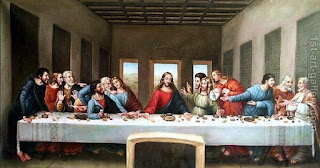The bishop (local congregational leader) has asked me to give a talk in church in October. I am thinking I will use as my topic the Sacrament (like Catholic communion). The Sacrament has incredibly rich symbolic meaning. Of course, the center of the Sacrament symbolism is the Savior. Jesus established the ordinance during his last supper with his disciples. "Take, eat, this is my body..." (Matt 26: 26). He clearly stated that the bread represented his body and the wine represented his blood that he was about to sacrifice for the sins of the world.
So, what does it mean that we eat and drink emblems of Christ's body and blood?
In one sense, by taking the bread and wine (or water in my church) we acknowlege that we are each a part of the need for an atonement. "All have sinned, and fall short of the glory of God." (Romans 3:23) and cannot be justified without the atonement and grace of Jesus. I am a sinner, the person sitting next to me is a sinner, the person on the stand is a sinner. We are all equal in our need of the grace of God so we all partake of the Sacrament.
But, also, by taking of the emblems of the sacrament, we also accept the grace of the atonement that is offered us. Jesus said, "I am the bread of life. He who comes to me shall never hunger, and he who believes in me shall never thurst." Just as bread feeds our physical body, God's grace through the atonement can nourish our spirits. Each person who partakes the bread and water can be strengthened. The Sacrament reminds us that we are all both condemned as sinners, and enabled to become saints.
During Covid-19 restrictions members in my church were permitted to administer the sacrament in our homes. For me and others I have talked to, this was a very special and sacred experience. But this is not the ideal. I don't think the church will ever perminantly do away with coming together to take the sacrament.
Meeting together to partake of the sacrament was a test of faith for early saints in the Holy Land. Jews were raised to be very careful not to eat with Gentiles. Their dietary laws prevented them from even using plates and utensils that might have touched foods that were considered "unclean". That is one reason why the Lord had to give Peter the vision of the unclean animals (Acts 10: 9-16) before he was convinced it was OK to share the gospel and a meal with gentiles. As the gospel spread to the Gentiles, the practice of meeting together to share the sacrament helped to unify the Jewish members and Gentile members
In the Book of Mormon the people who were witnesses to Christ's visit to the America "did meet together oft to partake of the bread and wine, in rememberance of the Lord Jesus." (Moroni 6:6) It is a great unifying ordinance. Each Sunday church members all over the world take the sacrament in the same way after hearing the same prayers. The connection also goes back through time. The Book of Mormon records that the sacrament prayers were the same then as they are now. With one ordinance we have a shared experience with all the saints from the present and from the past.
So why is it important that saints come together to partake of the sacrament? By partaking of the sacrament which symbolizes the body of Christ, we acknowlege that we are part of the Body of Christ. (1 Corinthians 12:12-30.) What does that mean? Christians generally agree that it was important for Jesus to obtain a physical body so that he could accomplish his work on this earth. What did he do with his physical body? He reached out and touched the unclean (Matt 8:3) He fed the hungry (John 8: 1-11). He blessed the sick (Luke 4:40) He comforted those that were mourning (John 11 32-35) and he cleansed the temple (John 2:15). Now that Jesus assended into heaven we are his physical body on earth. We are supposed to do the same kind of things. We are supposed to do what he would do with his physical body if he were here. We are his body, the Body of Christ.
By taking the sacrament we acknowlege all that; that we are all sinners, that we are all blessed with grace through the atonement, that we are all the Body of Christ, and that we all have the responsibility to do what he would do if he were here. Acknowleging that together unifies us and equalizes us. It also strengthens and enables us to keep the commandments and always remember him as we promise we will do. And God promises that if we do, and as we do, his spirit will be with us and help us.
So there are some thoughts about the Sacrament. There are even more symbols, but this is starting to be a long post, and so I will stop there.



